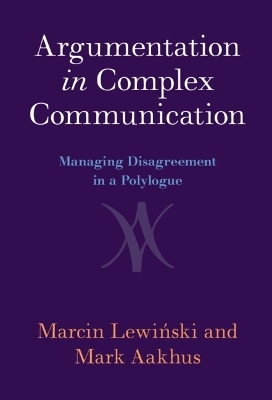
Argumentation in Complex Communication
Cambridge University Press (Verlag)
978-1-009-27437-1 (ISBN)
A pervasive aspect of human communication and sociality is argumentation: the practice of making and criticizing reasons in the context of doubt and disagreement. Argumentation underpins and shapes the decision-making, problem-solving, and conflict management which are fundamental to human relationships. However, argumentation is predominantly conceptualized as two parties arguing pro and con positions with each other in one place. This dyadic bias undermines the capacity to engage argumentation in complex communication in contemporary, digital society. This book offers an ambitious alternative course of inquiry for the analysis, evaluation, and design of argumentation as polylogue: various players arguing over many positions across multiple places. Taking up key aspects of the twentieth-century revival of argumentation as a communicative, situated practice, the polylogue framework engages a wider range of discourses, messages, interactions, technologies, and institutions necessary for adequately engaging the contemporary entanglement of argumentation and complex communication in human activities.
Marcin Lewiński is Assistant Professor in the Department of Communication and the Nova Institute of Philosophy, Nova University of Lisbon. His research applying philosophical concepts to the study of public argumentation has been published in journals, edited volumes and special issues (e.g. Environmental Argumentation, 2019). Mark Aakhus is Professor of Communication at Rutgers University. His scholarship on the relationship among communication, argumentation, and design in digital society has been published in journals, edited volumes and the co-edited volume Perpetual Contact (with James E. Katz, 2002).
Part I. Seeking, Seeing, and Embracing Polylogue: 1. Seeking polylogue; 2. The Dyadic reduction; 3. Seeing polylogue; 4. Embracing polylogue. Part II. Analyzing, Evaluating, and Designing Polylogue. 5. Descriptive analysis of polylogues; 6. Normative evaluation of polylogues; 7. Prescriptive design of polylogues. 8. Conclusion.
| Erscheinungsdatum | 12.12.2022 |
|---|---|
| Zusatzinfo | Worked examples or Exercises |
| Verlagsort | Cambridge |
| Sprache | englisch |
| Maße | 157 x 235 mm |
| Gewicht | 560 g |
| Themenwelt | Geisteswissenschaften ► Sprach- / Literaturwissenschaft ► Sprachwissenschaft |
| Sozialwissenschaften ► Ethnologie | |
| Sozialwissenschaften ► Soziologie | |
| ISBN-10 | 1-009-27437-6 / 1009274376 |
| ISBN-13 | 978-1-009-27437-1 / 9781009274371 |
| Zustand | Neuware |
| Informationen gemäß Produktsicherheitsverordnung (GPSR) | |
| Haben Sie eine Frage zum Produkt? |
aus dem Bereich


